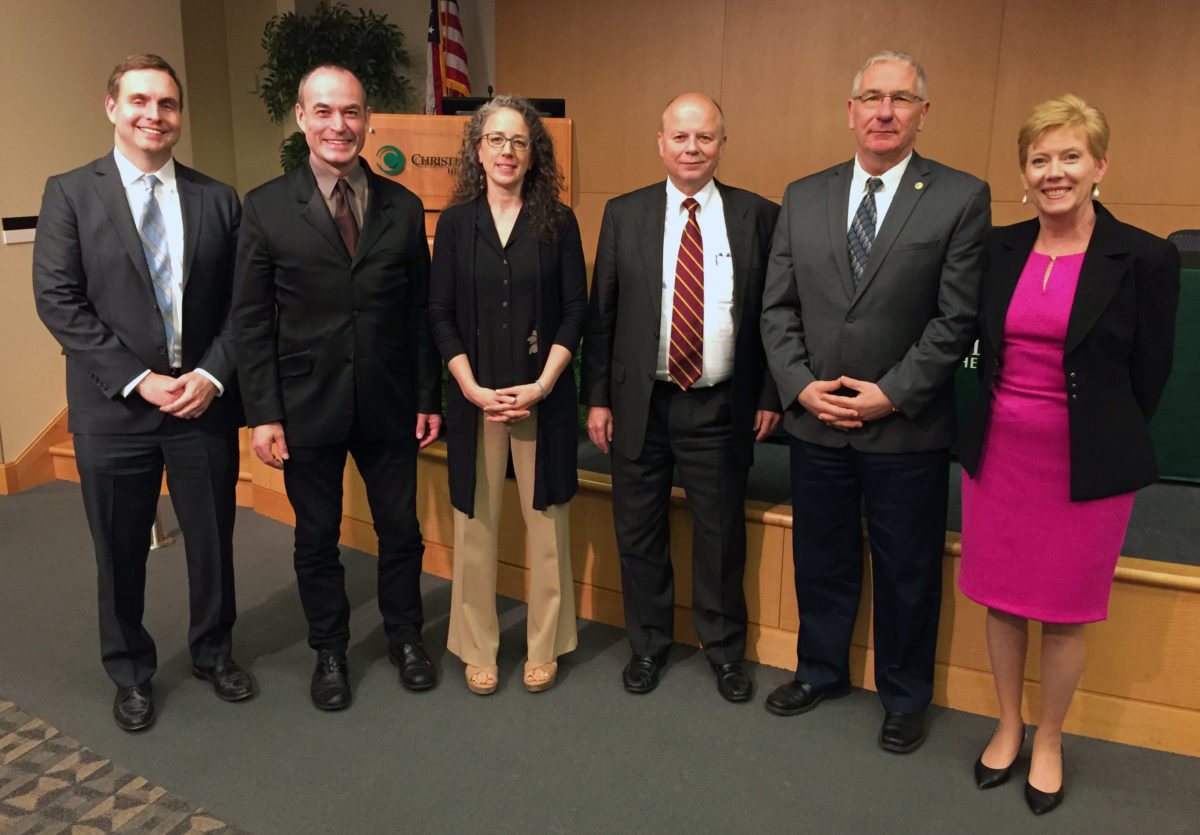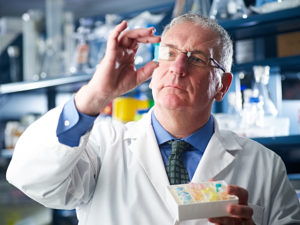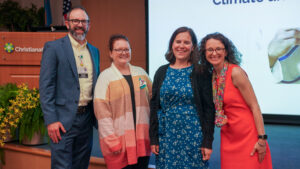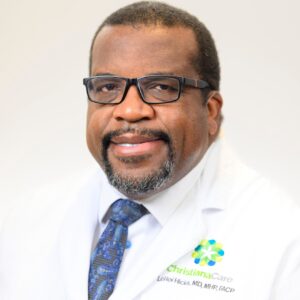The subject of TV news programs and magazine headlines, CRISPR gene editing technology is spearheading a biomedical revolution. Scientists are working to alter mosquito DNA to prevent malaria and modify pig organs for human transplant. The Gene Editing Institute of Christiana Care Health System is researching the use of CRISPR in lung cancer treatments.
But who owns CRISPR and its related technologies? Will insurance pay for gene editing procedures, and is it ethical to change human DNA?
Experts addressed these questions on June 8 during CRISPR Gene Editing 360: From Laboratory Science to Ethical Application, a symposium held at the John H. Ammon Medical Education Center at Christiana Hospital in Newark.
The event was organized by Christiana Care and the Delaware BioScience Association.
“CRISPR is arguably the hottest life-science technology, and it’s moving very quickly,” said Helen Stimson, president and CEO of the Delaware BioScience Association.
Eric Kmiec, Ph.D., director of the Gene Editing Institute, agreed. “This revolutionary technology is moving forward into the public domain much faster than any of us anticipated,” he said. “We do have a tremendous amount of enthusiasm, but at the same time, the reason we are sitting in this room today is because scientists, in general, are concerned about how these technologies affect the public. That’s a really good sign. We’re happy to host this conference. The gene editing revolution is here.”
He explained CRISPR (Clustered Regularly Interspaced Short Palindromic Repeats) by comparing it to a word processing program that can cut, insert and replace information. “We use molecular tools to do the same thing with genes,” he said.
CRISPR is precise. “If we imagine the genome as being a book with 1,000 pages, and each page contains 1,000 words, and there are 3,000 copies of this book, scientists with CRISPR can pinpoint one word — in fact, one letter — on page 91 on volume 1,349. That’s why we call it a revolution,” he said.
Therapeutic applications vary from gene therapy to controlling obesity. The Gene Editing Institute at Christiana Care’s Helen F. Graham Cancer Center & Research Institute is researching how CRISPR can reduce the amount of chemotherapy needed to treat lung cancer, the leading cause of death in Delaware.
In addition to the many lives it could save, the technology has the potential to earn billions of dollars for organizations with patents. “CRISPR certainly has garnered a lot of attention in the legal community, and to me, that’s a reflection of the breakthrough nature of the science,” said speaker Bob Oakes, Esq., a patent attorney with Fish & Richardson.
According to Oakes, there are more than 1,880 families of CRISPR patent applications, and more than 100 new families are published each month. Patents inspire innovation with the promise of a limited monopoly, he said.
Gene editing treatments might make money for a patent-holder and licensor, but they could be costly to a patient. “Insurance and how it’s structured has not really kept up with science,” said Edmund Pezalla, M.D., MPH, Ph.D., founder and CEO of Wethersfield, Connecticut-based Enlightenment Bioconsult, which incorporates payer requirements into development programs, technology assessment plans and value frameworks.
“We have a lot more important treatments for rare diseases that are very expensive,” he said. “We haven’t made provisions for how that can be taken care of and paid for without there being a large expense to the patients. We’re not sure we really understand how to move that across the pool of people or perhaps even across a pool of people over time.”
CRISPR also presents ethical concerns, which were addressed by Debra J. H. Mathews, Ph.D., MA, assistant director for science programs for the Johns Hopkins Berman Institute of Bioethics and associate professor in the department of pediatrics at John Hopkins University School of Medicine in Baltimore.
Countries and cultures have different beliefs when it comes to defining human life and when it begins. “It’s going to be up to individual countries — or in the case of the U.S., individual states — to make decisions about the use of the technology and if it is aligned with how we think of ourselves as human,” she said.
The conversation can’t wait. If patients can’t find a CRISPR procedure in their home country, they are bound to travel to one that offers it, she said.
The event also included a panel discussion led by moderator Mark Greene, Ph.D., research director at the Center for Science, Ethics & Public Policy at the University of Delaware.
About 160 people attended the symposium, including Irene Rombel, Ph.D., MBA, senior director of strategy, innovation and partnering for Janssen Research & Development.
“Gene editing has the potential to have a transformative impact on human health, including treating diseases that are currently intractable with current medicine,” she said after the event.
“Considering the myriad scientific, legal, regulatory, ethical and societal considerations that must be addressed at this nascent stage of therapeutic gene editing, the discussions at the CRISPR symposium were very timely and fostered a dialog among key stakeholders, including scientists, bioethicists, regulators, payors and — most importantly — health care providers, patients and the public.”
Melanie Mundell, a high school biotechnology teacher at Newark Charter School, attended the event with five of her students. “The CRISPR symposium was brilliant,” said Mundell, the 2016 Delaware Bio Educator of the Year. “All the speakers brought their different perspectives and considerations to the table — from describing the biology and its applications to the complications with the ethical, legal and insurance concerns that arise from this revolutionary technology.”



